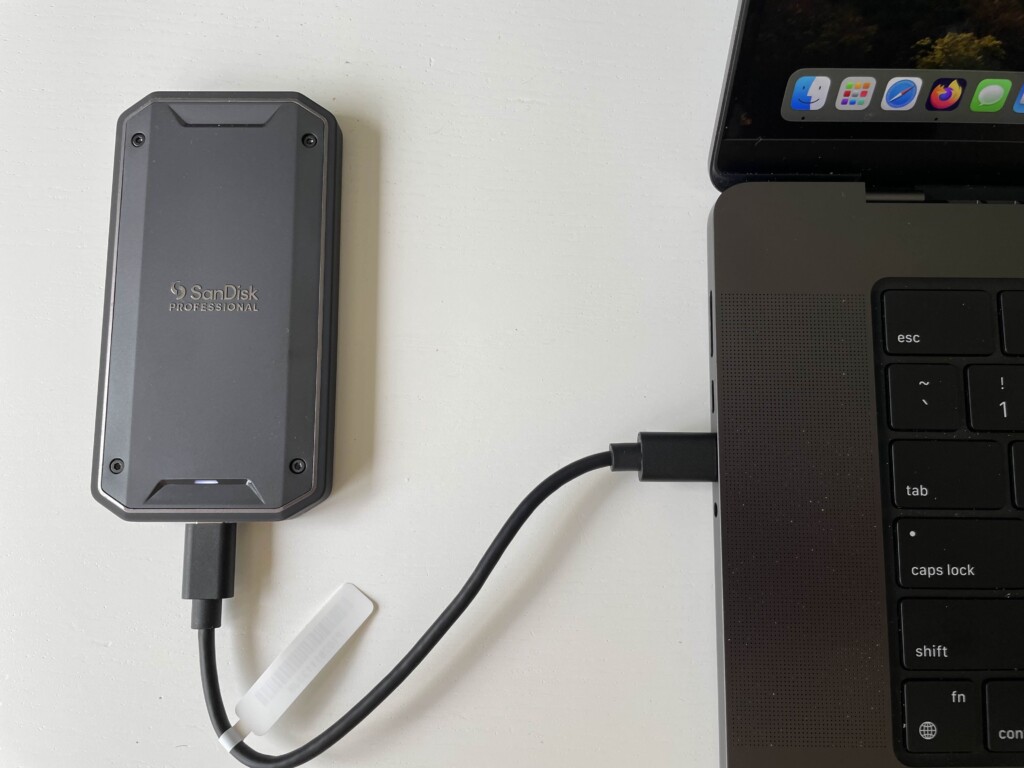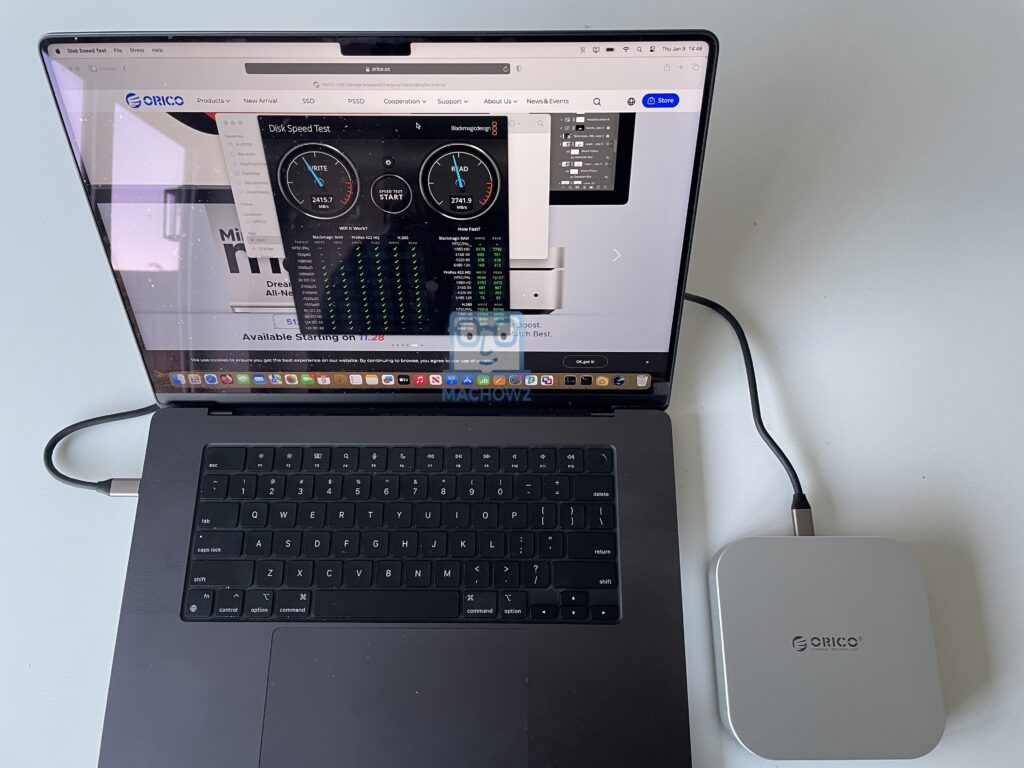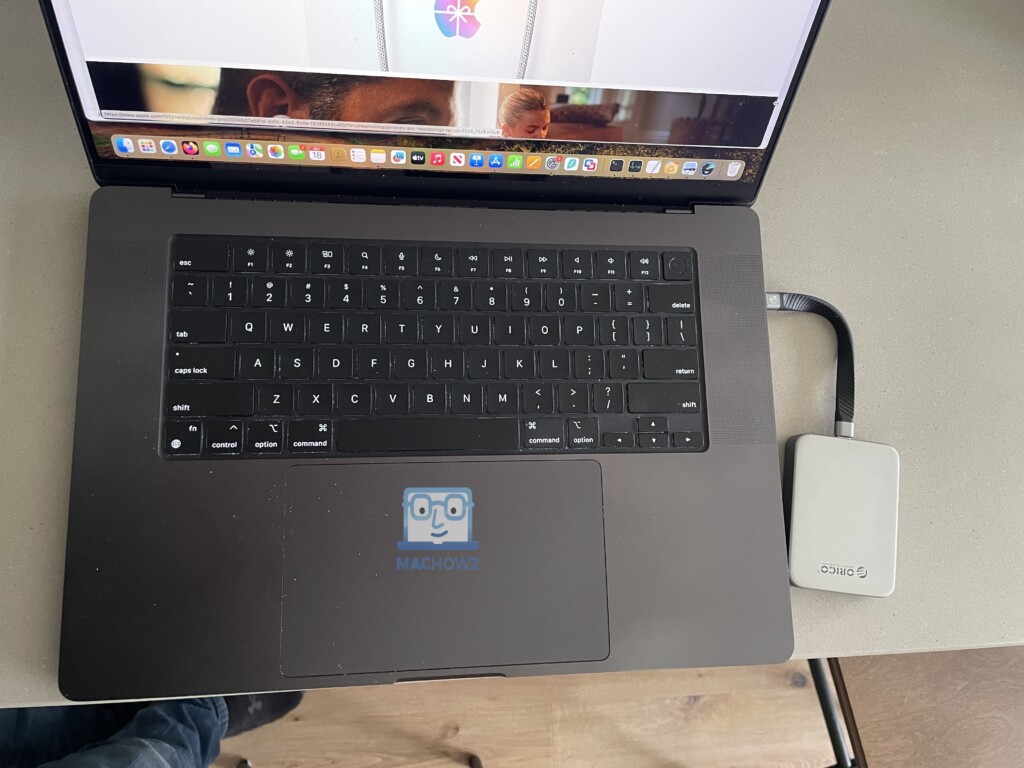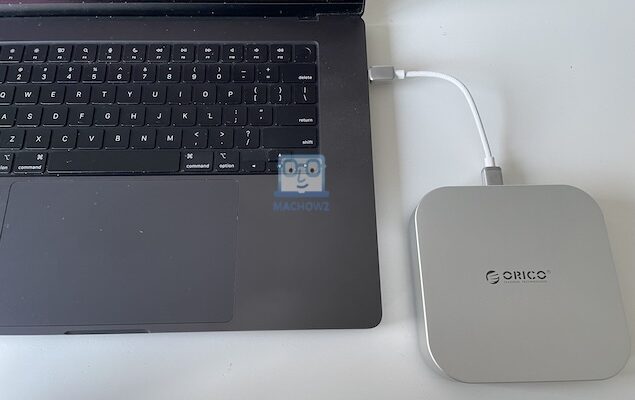External hard drives are an easy and cost effective way to increase the storage space of your Mac but with so many on the market, it can be confusing deciding which one to go for.
Although the fastest drives for Macs are Thunderbolt drives, they’re also the most expensive so here we’ve looked at a range of both the best SSD drives for Macs with a few older mechanical HDD drives to suit all budgets.
Since it’s now pretty much impossible to upgrade the storage internally on Apple Silicon Macs with the M-series chips, using one of these drives is a quick and cost effective solution.
Little more than a decade ago, you would have paid several hundred dollars for a chunky hard drive with just a few Gigabytes (GB) of storage space on.
Now you can get up 5 Terabytes (TB) of portable storage (that’s a whopping 5000 GB) for little more than $100.
However, not all external drives work as well with Macs or deliver the transfer speeds that the manufacturers promote so we’ve done the hard work for you and selected the best ones for using with macOS.
With this in mind, here are our reviews of the best Mac compatible external hard drives with an overview of our top picks to help you decide.
Table of Contents
1. SanDisk Professional Pro-G40 SSD

The SanDisk Professional Pro-G40 SSD is the fastest external drive we’ve ever used on a Mac and our pick as best Thunderbolt external drive for Macs.
Because it supports Thunderbolt rather than just simply connecting via USB-C, it’s capable of ridiculously fast transfer speeds of at least 2500MB/s.
That’s around 50GB of data transferred in less than a minute.
The SanDisk Professional Pro-G40 SSD is mainly aimed at creative users such as video editors and graphic designers that transfer several GB of data regularly.
It’s surprisingly durable too with an IP68 rating for water resistance and drop resistant up to 3 meters according to SanDisk.
In addition, it is available in 1TB, 2TB and 4TB versions with the biggest version costing around $399.
The SanDisk Pro G40 is also an excellent, cheaper replacement for the Samsung X5 which used to be the best Thunderbolt drive out there but is now discontinued.
Check out our SanDisk Pro G40 review for more.
Pros:
- Supports Thunderbolt for transfer speeds of around 2500MB/s
- IP68 rated with impressive durability
- Also works with any computer with a USB-C port
- Cheaper alternative to the discontinued Samsung X5
Cons:
- Price
2. Orico Mini Mate

If you’re looking for value, then look no further than the Orico Mini Mate SSD external drive.
With support for Thunderbolt speeds of up to 30Gbps in our tests and prices starting at $99.99 for the 512GB version, it’s one of the best value external drives we’ve used.
Designed to stack perfectly on top of the M4 Mac Mini (hence the name), it can be used with any Mac that has a Thunderbolt port.
The design is very Apple like and it looks great with any model of Mac. Power is supplied via the USB-C cable so there’s no need for an external power supply either.
The drive is available in a range of sizes starting from 512GB up to 8TB.
We found there were some heat issues when used over long periods and there is a low humming fan active when in use but overall, the Orico Mini Mate is excellent value for money.
Check out our full Orico Mini Mate review for more.
Pros:
- Excellent value
- Looks great with Mac Minis
- Fast read speeds of up to 30Gbps
- Slick design
Cons:
- Can get hot with long usage
- Fan a bit noisy
3. OWC 4TB Envoy Ultra
If you’re using an M4 Mac or newer, the OWC Envoy Pro TB5 is one of the few external drives that takes full advantage of Thunderbolt 5’s blazing speeds.
Engineered for professionals, the OWC Envoy Ultra delivers performance exceeding 6,000MB/s—nearly matching the speed of your Mac’s internal SSD. This makes it up to twice as fast as Thunderbolt 4 and USB4 alternatives.
Housed in a durable, fanless aluminum body, the drive offers quiet, heat-efficient operation, making it ideal for mobile and on-the-go workflows.
Whether you’re editing 5K or 8K footage, handling intensive 3D projects, or backing up large files, the Envoy Ultra delivers the high performance you need.
Designed with portability and resilience in mind, it’s crush-resistant, dustproof, and water-resistant.
While it shines with Thunderbolt 5, it remains compatible with Thunderbolt 3 and 4—though speeds will scale back accordingly.
Thunderbolt 5 is quickly becoming the new standard, and you can learn more about its advantages in our comparison of internal SSD upgrades versus external Thunderbolt 5 solutions.
Buying Tip: If Amazon runs out of stock, you can also purchase the OWC Envoy Pro TB5 directly from OWC.
Pros:
- Ultra-fast Thunderbolt 5 speeds (6,000MB/s+)
- Rugged and weather-resistant
- Fanless aluminum chassis for silent performance
- Compatible with Thunderbolt 3 and 4
- No need for external power
- Available up to 4TB
Cons:
- Premium price point
- Built-in (non-removable) Thunderbolt 5 cable
- Full performance only on Macs with Thunderbolt 5 ports
4. Orico K20

If you don’t need Thunderbolt speeds but want portability and iPhone connectivity, then check out the excellent Orico K20 external drive.
The K20 has a magnet attached so that it clips neatly onto the lid of any MacBook or onto the side of an iPhone for storage you can take anywhere.
The Orico K20 supports USB-C speeds of around 9Gbps which is less than a third you’d get from a Thunderbolt drive but is still enough for editing 4K video, working with RAW files and backups.
With the 512GB version starting at just $69.99, the Orico K20 is good value for money with prices going up to $189.99 for the 2TB model.
The drive doesn’t have an IP rating for dust and water resistance though so it’s not the most robust of drives but it’s pocket portability will appeal to anyone that need storage on the move.
Check out our full Orico K20 review for more.
Pros:
- Excellent value
- Magnetically connects to MacBooks and iPhones
- Very small and portable
- Tasteful design
Cons:
- Not compatible with older iPhones
- No IP resistance rating
5. WD My Passport For Mac HDD
The Western Digital My Passport For Mac is an excellent value hard drive thanks to a solid combination of reliability, value for money and portability.
Western Digital are the biggest name in external storage and now own other popular brands such as SanDisk and Hitachi storage devices.
For those that want a drive for backups, the WD My Passport For Mac is ready formatted for use on Mac and Time Machine ready out of the box.
For those that want portability too, the WD My Passport is small enough to fit in your coat pocket.
If you’re going to carry it around a lot however, we also recommend getting a proper carry case for it too as because it’s an HDD with moving parts inside, it’s more prone to damage than an SSD.
There is also however an SSD version of this drive available but it’s more expensive and only goes up to 4TB.
5TB is the biggest version available in the My Passport Portable HDD range although the cheapest starts at just 500GB.
The drive supports USB-C connections but it will also work with older USB 2.0 connections which makes it compatible with both older Intel Macs and newer Apple Silicon Macs.
The one slight drawback of the product is the optional WD Discovery software used to manage it does not work natively on Apple Silicon Macs.
It still works using Rosetta in macOS but the performance can be unstable although you really don’t need to unless you want to set a password or download your social media data onto it.
You can also check out our full WD My Passport For Mac Portable review for a more in-depth look.
Pros:
- Very reliable
- Works with both older Intel Macs and Apple Silicon Macs
- Ready formatted for Macs
- Good value for money
- Supports USB-C connections
- 3 Year Warranty
Cons:
- Limited to maximum of 5TB
- WD Discovery software
- Slow compared to SSD drives
6. Samsung T7 Portable SSD
The Samsung T7 Portable SSD is one of the fastest SSDs we’ve seen outside of the incredibly fast Thunderbolt SanDisk Professional Pro-G40 SSD.
The Samsung T7 SDD has a USB-C connection which will connect to any Thunderbolt port on a Mac but also comes with a USB-C to USB-A cable in the box for backwards compatibility.
The Samsung T7 Portable can read/write at up to 1050 MB/s although because it’s not Thunderbolt and relies on USB 3.2 Gen 2.2, Mac users will only see around 650 MB/s.
It can be used with Mac, PC and Android devices although it’s not ready formatted for macOS out of the box so you’ll have to format it yourself.
In terms of size, the T7 is incredibly portable as it’s not much bigger than a credit card, weighing just 58 grams.
Although this also makes it easy to drop, the Samsung T7 is shock resistant and Samsung claims it can even withstand 1500G of G-force, equivalent to being dropped from 6.5 feet.
If you want a fast, portable SSD that doesn’t come with a Thunderbolt price-tag, the Samsung T7 is an excellent external drive for Mac users.
Pros:
- Super fast SSD drive technology
- Silent hard drive
- Incredibly small and compact
- Shock resistant
Cons:
- Price compared to external mechanical HDD drives
- Samsung software that comes with it
- Doesn’t support full Thunderbolt speeds
7. Transcend StoreJet 25M3C HDD
The best thing about the 4TB Transcend StoreJet is that it’s incredibly tough which makes it ideal for using on the move.
For those that need a storage or backup device to use out in the field such as photographers and video makers, it’s the most durable hard drive we’ve seen.
In fact, Transcend claim that the StoreJet is military drop tested with an advanced 3 stage shock protection system thanks to an incredibly strong anti-shock rubber outer case.
The Transcend StoreJet also comes with its own software that can be used for one-touch backups.
Just press the button on the Transcend and the software will automatically backup your data although it also works with Time Machine.
Although there is an older USB 3.0 version of the StoreJet, the 25M3C model also has a USB-C port so it can also be used with Apple Silicon Macs.
The slight drawback is that its not ready for Macs out of the box so you must format it first although this is very easy to do.
In tests, we’ve seen read/write speeds of around 115MB/s with the StoreJet 25M3C which is typical for an HDD.
If you’re going to using an external storage device outside, the Transcend StoreJet is the strongest external hard drive for Mac we’ve seen.
Pros:
- Incredibly strong and durable
- One touch backup system
- Encrypts files and folders
Cons:
- Requires formatting first to work with Macs
- Slow compared to SDDs
8. Seagate Ultra Touch HDD
Seagate is one of the biggest names in external hard drives and also the most environmentally conscious offering an “eco-friendly” 30% recycled version of its hard drive.
The Seagate Ultra Touch HDD features a USB-C connection that will connect to any Apple Silicon Mac with capacities going from 500GB to 5TB.
The smaller capacity models are available in white while the bigger ones are available in grey.
It’s also formatted out of the box for use on Macs and Time Machine ready for instant backups.
It also comes with the Seagate Dashboard backup software although its quite bloated and hard to customize so we recommend sticking to Time Machine for backups.
The Ultra Touch HDD is ultra-portable and light enough to put in your coat pocket or backpack.
However, it’s not drop resistant although you can also get a shockproof carry case for it.
Users in the USA can also take advantage of Seagate Rescue Services to try and recover data if the drive gets damaged.
You should get read-write speeds of around 130MB/s which isn’t bad for a portable HDD although this is painfully slow compared to an SSD.
Pros:
- Works out of the box with Macs
- Compatible with Thunderbolt ports via USB-C
- Time Machine ready
- Very portable
Cons:
- Seagate backup software
- Slow compared to SSDs
Mac External Hard Drive Buying Guide
Before buying an external hard drive for your Mac, it’s important to understand your options and what to expect in terms of speed, compatibility, and performance.
Types of External Drives for Mac
1. HDD (Hard Disk Drive)
- Best for: Affordable, high-capacity storage
- Speed: Around 115 MB/s
- Pros: Budget-friendly, large storage sizes
- Cons: Slow, contains moving parts, more prone to failure if dropped or moved while active
2. SSD (Solid State Drive)
- Best for: Faster performance, better reliability
- Speed: Typically 650–1250 MB/s on Mac (due to USB 3.2 Gen 2 or 2×2 limitations)
- Pros: Fast, no moving parts, durable
- Cons: More expensive than HDDs
Note: Macs don’t fully support USB 3.2 Gen 2×2 speeds, so advertised speeds may be higher than what you’ll actually see.
3. Thunderbolt SSD
- Best for: Maximum speed and performance
- Speed: Around 2500 MB/s (Thunderbolt 3/4), up to 6000 MB/s with Thunderbolt 5
- Pros: Lightning-fast, ideal for 4K/8K video editing and large file transfers
- Cons: Higher cost, limited to Macs with Thunderbolt ports
Thunderbolt vs USB-C
All modern Macs have Thunderbolt ports (3, 4, or the newest: 5), but they use the same physical USB-C connector. However, Thunderbolt and USB-C offer very different performance levels.
| Connection Type | Max Speed |
|---|---|
| USB 3.2 Gen 2 | 10 Gbps |
| USB 3.2 Gen 2×2 | 20 Gbps |
| Thunderbolt 3/4 | 40 Gbps |
| Thunderbolt 5 | 80 Gbps |
Tip: If you want the fastest possible speeds, choose a Thunderbolt-compatible SSD. USB-C drives will work, but at slower transfer rates. For more check our look at why you should always get Thundberbolt drives for Macs.
Does Apple Recommend a Specific External Drive?
Apple no longer manufactures or officially recommends external drives. The only Apple-branded solution, the AirPort Time Capsule, was discontinued in 2018. We do not recommend buying a refurbished one today—it’s outdated, limited in capacity (2–3TB), and much slower than current wired solutions.
Instead, we suggest using any modern external SSD or Thunderbolt drive along with Time Machine for backups.
Compatibility & Formatting
Most external drives work with macOS, but some require reformatting. Here’s what you need to know:
- Mac-only use: Format as APFS or Mac OS Extended (Journaled)
- Mac & Windows: Format as exFAT (avoid FAT32 due to 4GB file size limit)
You can easily reformat any external drive using the Disk Utility app in macOS.
Reliability & Backup Tips
Even high-quality drives can fail, especially with frequent use (like video editing or 24/7 operation). Here’s how to protect your data:
- Use two backups: One local (external drive), one cloud-based (e.g., iCloud, Dropbox, or Backblaze)
- Avoid moving HDDs while in use: Movement can damage the internal components
- Use SSDs for mobility: No moving parts = better for travel
- Consider a surge protector: Protect your drive and Mac from power surges
How Much Storage Do You Need?
Storage needs vary, but here’s a rough idea of what common sizes offer:
| Capacity | Approx. Storage |
|---|---|
| 1TB | ~488,000 photos or 220 HD movies |
| 2TB–5TB | Ideal for large media libraries or full system backups |
| 8TB+ | Best for professionals or long-term archiving |
Advice: Buy the largest capacity you can reasonably afford. File sizes (especially videos) keep getting bigger, especially with 4K and 8K formats.
Final Thoughts
When choosing a drive for your Mac:
- For casual backups or storage, a USB-C HDD or SSD is fine.
- For creative work or performance-heavy tasks, choose a Thunderbolt SSD.
- Always keep a second backup and use iCloud for extra peace of mind.
- Consider a surge protector to prevent data loss during power spikes.
Need more help? Check out our guides to the best SSDs and best Thunderbolt drives for Macs.













